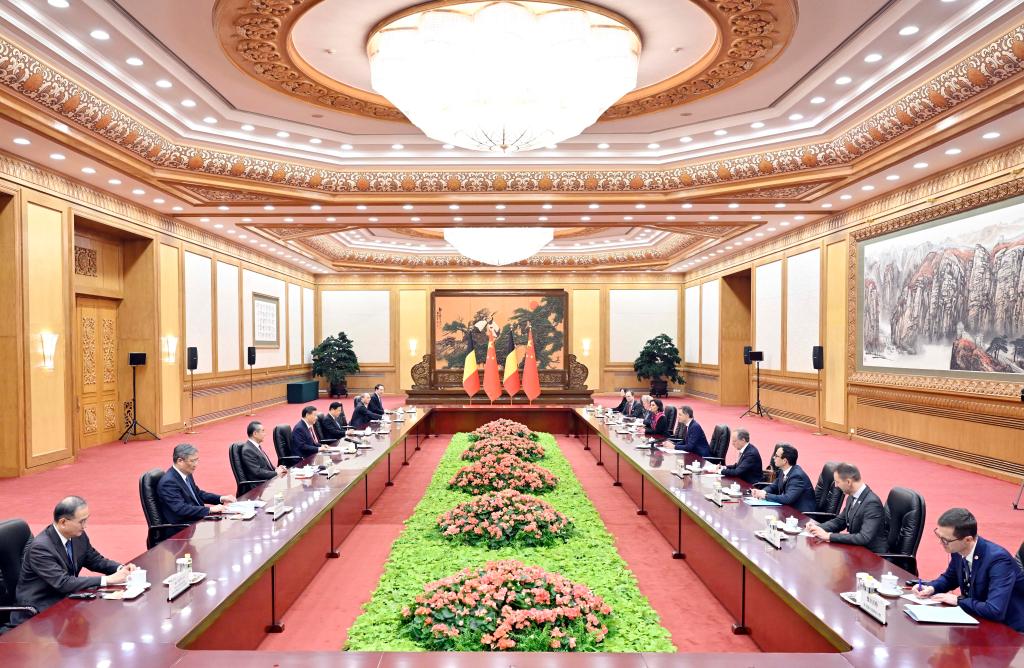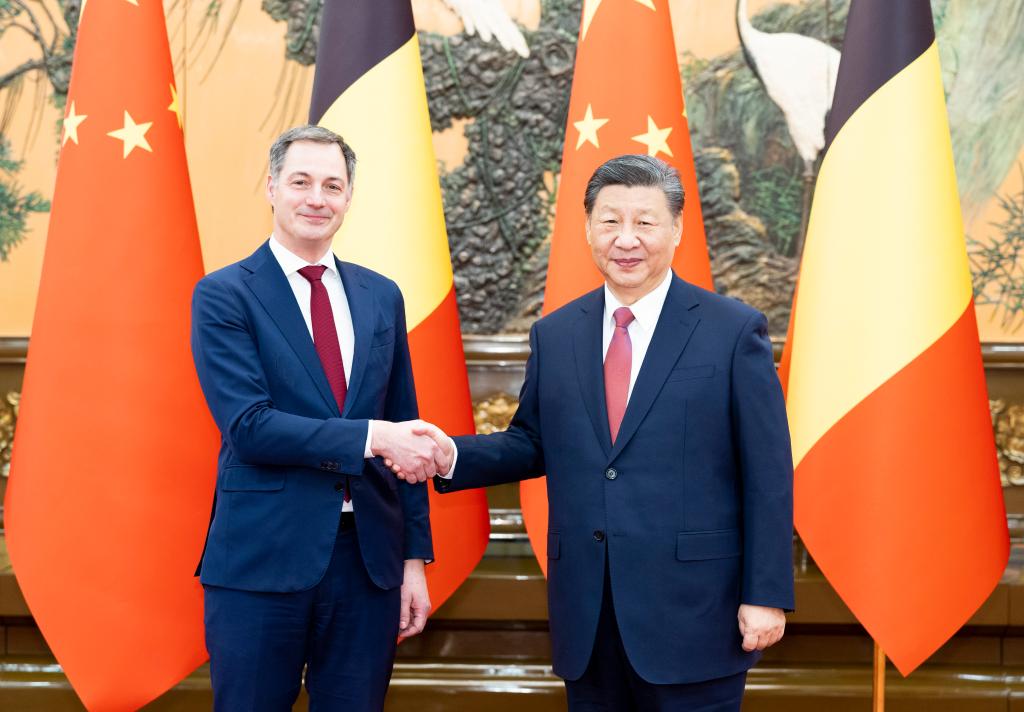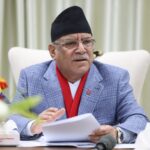The meeting carries unique significance as it opens a new year of high-level diplomacy between China and the EU in 2024, and can serve as an opportunity for the two sides to continue the momentum of engagement to deepen mutual understanding and expand cooperation, analysts said.
Such contact is even more important when the world is struggling with a sluggish economy, geopolitical uncertainty and regional conflicts, they said.
New momentum
China and Belgium are both beneficiaries of economic globalization and share common interests in resisting protectionism and safeguarding free trade, Xi told De Croo, the Xinhua News Agency reported.
China appreciates De Croo’s open opposition to the decoupling or severing of industrial and supply chains on many occasions, welcomes Belgian companies to invest in China, and stands ready to provide them with a sound business environment, Xi said, expressing his hope that Belgium will also provide a fair, transparent and non-discriminatory business environment for Chinese companies.
Xi said the two sides can combine their respective strengths to expand cooperation in traditional areas such as transportation, logistics and biopharmaceuticals, and explore new growth areas for cooperation such as green development and digital economy.
He called on the two sides to encourage government departments, legislatures, and sub-national areas to strengthen exchanges and dialogue, expand tourism and exchange of students, organize large-scale cultural activities in each other’s country, and carry out research on giant panda protection.
Xi said China is willing to strengthen communication with Belgium within multilateral frameworks such as the UN and carry out cooperation on issues such as climate change and biodiversity protection.
De Croo said the Belgium-China relationship is a pacesetter in European countries’ ties with China in many aspects, noting that Belgium will continue to abide by the one-China policy, and have candid dialogue with China to deepen understanding and push for continuous development of bilateral relations in political, economic and other fields.
De Croo said Belgium opposes decoupling or severing of industrial and supply chains, welcomes Chinese enterprises to carry out cooperation in Belgium, and hopes to strengthen personnel and cultural exchanges with China.
A number of Belgian entrepreneurs accompanied De Croo on his visit, including industry leaders such as Solvay and Bekaert, said Cao Zhongming, Chinese ambassador to Belgium.
“I believe they will take full advantage of the high-level visit opportunity to engage in in-depth exchanges and collaborative discussions with Chinese officials and the business community to inject new impetus into bilateral economy, trade and investment cooperation,” Cao told the Global Times in an exclusive interview.
China and the European Union (EU) have already conducted frequent interactions in 2023. But the visit by the Belgian prime minister carries unique significance as the country is the EU’s political heartland and holds the presidency of the Council of the EU for 2024.
During the Friday meeting, while stressing that China maintains long-term consistency in its policy toward Europe, Xi said China has always regarded Europe as a partner and hopes that Europe will play a positive and constructive role as an important force in a multipolar world.
In the face of the changing and volatile international situation, China and Europe need to build more “bridges,” he added.
Xi said the two sides should work more closely to promote an equal and orderly global multipolarity and an economic globalization that benefits all, and jointly promote world peace, stability and prosperity.
China is willing to work with the EU to foster progress in China-EU relations in the new year and hopes that Belgium, as the EU rotating presidency, will play a positive role in this regard, Xi added.
De Croo noted that he was deeply impressed by President Xi’s vivid description of “bridges” during his visit to Belgium a decade ago.
Amid the changing and turbulent international situation, the world needs China and Europe to work as partners and strengthen cooperation in a wide range of areas such as promoting world economic growth, addressing climate change and building a more stable world, De Croo said.
Belgium, as the rotating presidency of the EU, is willing to play an active role in the development of EU-China relations and hopes that this visit will help elevate Belgium-China and EU-China relations, he added.
Cui Hongjian, a professor at the Academy of Regional and Global Governance of Beijing Foreign Studies University, told the Global Times on Friday that China-Belgium relations remain more stable with China-EU ties witnessing major changes in the past few years. It is hoped that the country can make positive contributions to resolving some China-EU trade disputes, Cui said.
The expert also underlined that China and EU should communicate on global hot spot issues including the Russia-Ukraine conflict and Palestinian-Israeli conflict, and try to maximize common views to facilitate the settlement of those issues.

Chinese President Xi Jinping meets with Prime Minister of the Kingdom of Belgium Alexander De Croo at the Great Hall of the People in Beijing, capital of China, Jan 12, 2024. Photo:Xinhua
Coping with changes
Despite the overall momentum of engagement, noises and waves still persist in China-EU relations. The European Commission initiated an anti-subsidies probe into electric vehicles (EVs) from China in October 2023 and hyped Chinese espionage in recent months.
Zhao Junjie, a research fellow at the Chinese Academy of Social Sciences’ Institute of European Studies, told the Global Times that trade disputes between China and the EU are nothing new, and there have been many cases of this. However, they have not affected bilateral economic and trade cooperation in the past.
The “spy” claims were mainly hype from some media and right-wing politicians, Zhao said, as he stressed both sides should avoid escalating individual cases in certain fields to the level of overall trend of bilateral ties.
It is irresponsible and shortsighted to conclude that “sound China-EU relations are over” as a result of small skirmishes, Zhao said.
According to analysts, the EU shows duality in dealing with China – emphasizing cooperation while being harsh on values and ideology.
Cui pointed out that Europe has to cling to “political correctness” on “political” topics such as security and human rights. “Improving the EU’s public opinion environment [toward China] and dispelling misconceptions requires practical cooperation and remains a challenging task.”
China also recognizes that the EU’s position – its economic structure and security dependence on the US – means it is difficult to maintain a completely independent policy, and handles disputes with the bloc in a way that is resilient to external disruptions, Cui said.
The EU is encouraged to adjust its mind-set in front of a strong China that is different from Europe in many aspects but is a sincere and trustworthy partner, analysts said.
Through a series of interactions in 2023, China and the EU have reached consensus on the importance of bilateral relations as well as the fact that the relationship is undergoing major changes.
“The crux is how to cope with the changes,” Cui said. China copes with them with a positive attitude, believing that changes bring about new opportunities; but the EU tends to see those changes through a negative lens as risks and challenges.
Against the backdrop of a resurgence in European populism and conservatism and the European Parliament elections, the EU is in urgent need of leaders who have the strategic vision and political wisdom to guide the bloc as it goes through this concurrent turbulence, Chinese observers said.
They hope that in 2024, more European politicians can come to visit China, see a real China through their own eyes and engage with China in person, so as to establish a more comprehensive and less biased view of the country on the other end of the Eurasian continent.




